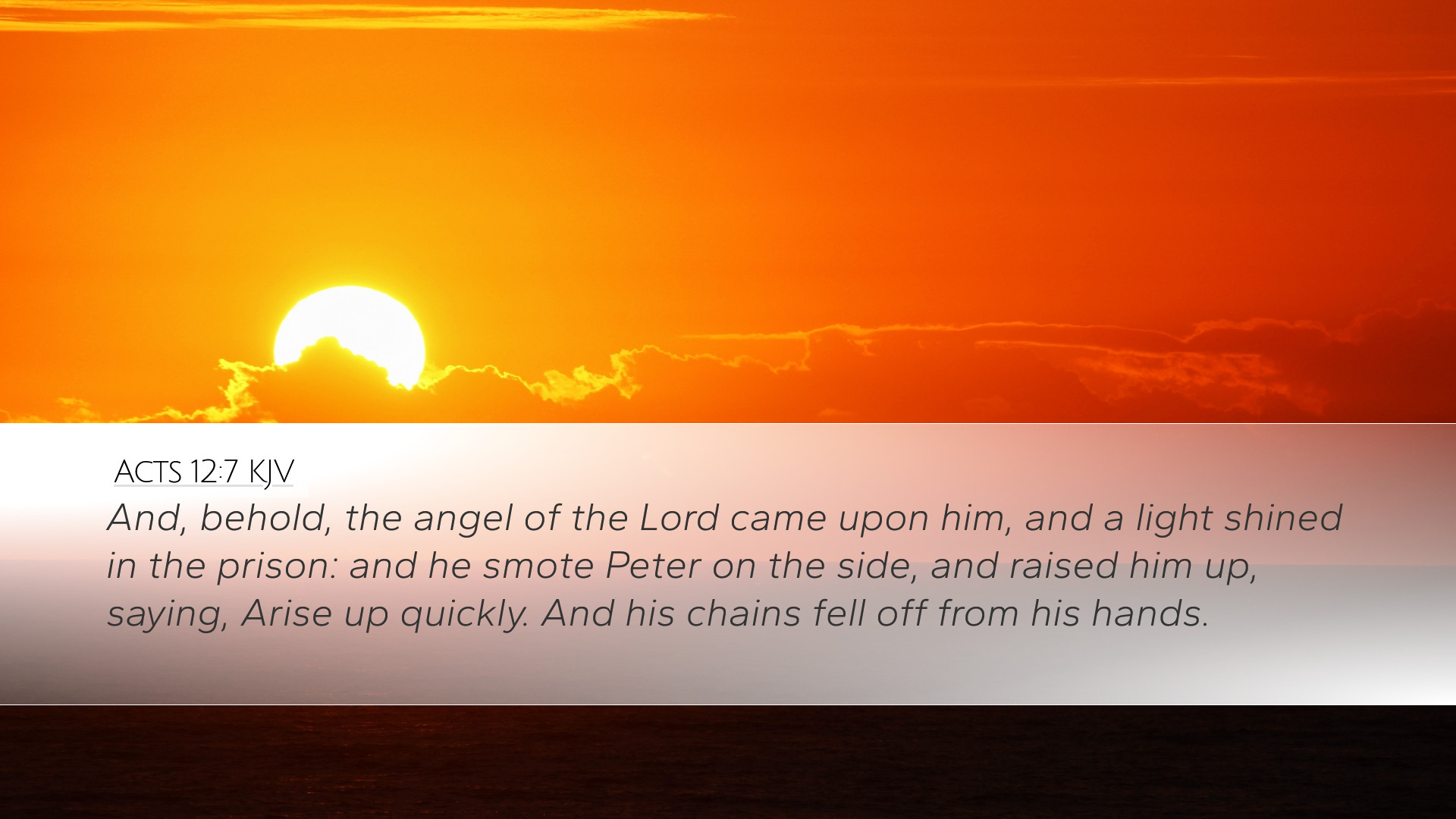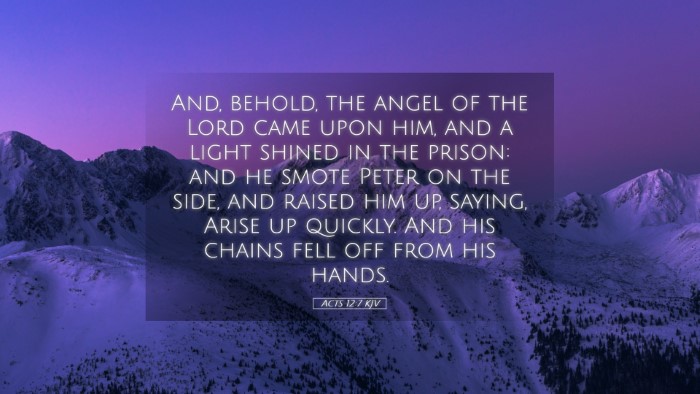Old Testament
Genesis Exodus Leviticus Numbers Deuteronomy Joshua Judges Ruth 1 Samuel 2 Samuel 1 Kings 2 Kings 1 Chronicles 2 Chronicles Ezra Nehemiah Esther Job Psalms Proverbs Ecclesiastes Song of Solomon Isaiah Jeremiah Lamentations Ezekiel Daniel Hosea Joel Amos Obadiah Jonah Micah Nahum Habakkuk Zephaniah Haggai Zechariah MalachiActs 12:7
Acts 12:7 KJV
And, behold, the angel of the Lord came upon him, and a light shined in the prison: and he smote Peter on the side, and raised him up, saying, Arise up quickly. And his chains fell off from his hands.
Acts 12:7 Bible Commentary
Commentary on Acts 12:7
Acts 12:7 states: "And, behold, the angel of the Lord came upon him, and a light shined in the prison: and he smote Peter on the side, and raised him up, saying, Arise up quickly. And his chains fell off from his hands." This verse serves as a pivotal moment in the narrative surrounding Peter's imprisonment and subsequent miraculous escape. Below is a combined commentary that draws insights from prominent public domain sources such as Matthew Henry, Albert Barnes, and Adam Clarke.
Contextual Understanding
The context of this chapter reveals the dire circumstances faced by Peter, who was imprisoned by King Herod. This act was politically motivated, aiming to please the Jewish leaders by persecuting the church. The earlier verses recount how Herod killed James and sought to do the same with Peter, indicating the intensity of the threat against the apostles.
Divine Intervention
The angelic appearance in verse 7 exemplifies divine intervention—a common theme throughout Scripture where God responds to His people's distress. As Matthew Henry elucidates, the presence of the angel signifies God’s readiness to save His servants not only from peril but also from despair.
- Light in Darkness: The shinning light in the prison symbolizes hope and divine guidance amidst despair. It reflects the biblical motif of light as a manifestation of God’s presence (John 1:5).
- Encouragement: The act of the angel smiting Peter’s side to awaken him showcases God’s urgent desire to deliver His people from bondage, emphasizing the role of encouragement in divine rescue.
Symbolism of Chains
The chains falling from Peter’s hands serve as a powerful metaphor for spiritual freedom. Albert Barnes articulates that this physical liberation points toward the greater spiritual reality of freedom from sin and oppression that Christ grants to believers. The removal of chains can be perceived as a vivid illustration of God removing obstacles that hinder His work in the lives of His followers.
The Call to Action
The directive from the angel, “Arise up quickly”, not only sets the tone for Peter’s immediate response but also reflects God's urgent call to action. Adam Clarke expounds on the importance of obedience in the face of miraculous grace. When believers receive divine assistance, they are called to engage actively with that grace through their actions.
Theological Implications
This verse raises several theological points worthy of reflection:
- The Sovereignty of God: The narrative affirms God’s ultimate authority over earthly situations, including prisons and political constraints. His ability to send an angel and unlock chains illustrates His sovereignty and omnipotence.
- The Nature of Faith: Peter’s eventual obedience illustrates the nature of faith acted upon. His response to the angel's command reflects a human willingness to cooperate with divine will.
- God’s Faithfulness: Despite Peter's dire circumstances, God's faithfulness is unfaltering. This serves as a reminder that believers can trust in God’s ability to deliver them from trials.
Practical Applications
For pastors, students, theologians, and scholars, Acts 12:7 offers several applications:
- Encouragement in Trials: The verse encourages believers undergoing trials to recognize God’s presence and potential for deliverance.
- Awareness of Spiritual Warfare: The context of imprisonment reflects the broader spiritual warfare believers face. It urges a constant awareness of God's activity and presence in difficult situations.
- Call to Obedience: Believers are reminded to respond promptly and actively to God’s nudges and directions, trusting in His plans for their lives.
Conclusion
Acts 12:7 encapsulates a striking moment of divine rescue, underscoring God’s power, presence, and faithfulness. It beckons believers to embrace both the light that dispels darkness and the chains of bondage that can fall away through faith. This commentary serves to deepen understanding and provoke thoughtful reflection on the miraculous workings of God in the lives of His people.


